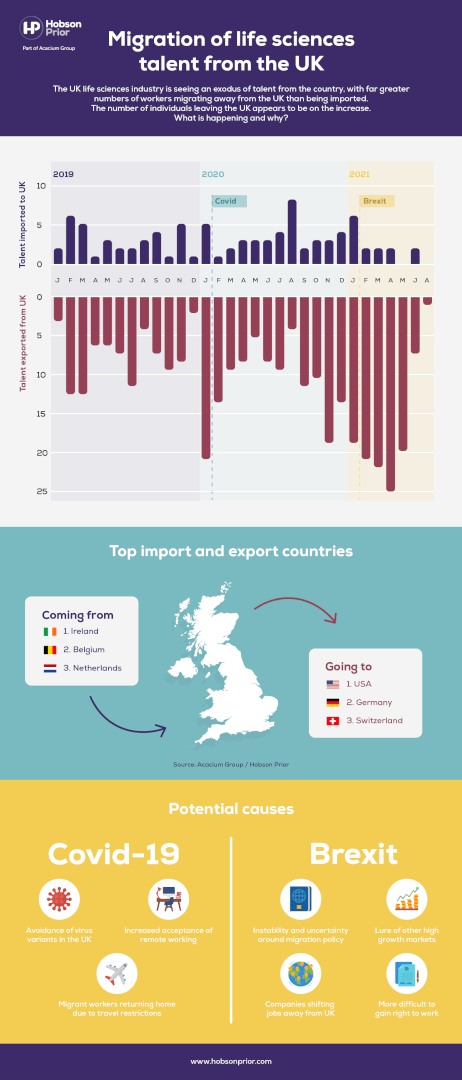Has Brexit impacted mobility in life sciences recruitment?



The UK officially left the European Union on 31st January 2020, with the transitional period ending in January 2021. With the EMA moving its headquarters to Amsterdam and much uncertainty regarding the funding and ease of movement for life sciences professionals, it was unclear how this would impact life sciences recruitment and the mobility of talent.
In 2019, Hobson Prior conducted a survey with life sciences professionals, asking for their opinions on how Brexit would impact career opportunities and the industry in general. Two years on, we revisit how the mobility of life science professionals has been affected.
Leading up to Brexit
When we surveyed life sciences professionals from across Europe and the EU, there were concerns and uncertainty regarding international hiring.
When asked what impact they believed Brexit would have on hiring professionals from the EU to work in the UK, the majority (69%) expected there to be a negative impact, many feeling even if it was offered, EU candidates would be discouraged by Brexit to apply.
“For UK positions, I feel UK citizens will be the desired candidates, no visa permits to check for example” – UK based regulatory affairs director
“I expect to receive less offers from UK as a non-UK citizen. Companies will not consider my application due to the complexity of the immigration process.” – EU-based validation engineer
When asked about what impact they believed Brexit would have on hiring candidates from the UK to the EU, there was much more uncertainty as not all decisions had been finalised, leading to the majority (50%) predicting a cautious, but neutral impact.
“We will always be able to hire the best fit for the job, be they from UK, EU or outside the EU”. – UK based technical operations consultant
“I will have to compete with people who already have freedom to work and live in the EU. I cannot see why hiring managers will make more work for themselves” – EU based specialist senior programmer
“Managers are more inclined to promote existing workers and not poach employees from abroad” – UK based medical engineer
Life sciences mobility today
We examined the mobility of life sciences talent over 1,344 global placements made by our business since the announcement of Brexit and the UK’s long transition to leave the European Union. What this data showed is that the UK is seeing greater numbers of life sciences talent migrating from the UK than being imported.
Most life sciences leaving the UK is going to the US and Germany, two markets that have seen a distinct growth over this period, followed by another Non-EU country, Switzerland.
Most life sciences talent coming to the UK is from Ireland (46%), followed by Belgium and the Netherlands.
Why has the UK seen many life sciences talent leave in the last two years?
Many factors have affected this movement of talented professionals, but the two standout events in this period are Brexit and the global Covid-19 pandemic.
Covid-19: No one expected the global impact and severity of the pandemic. Whilst the life sciences were relied upon for a fast response, many other projects and sectors of the life sciences were heavily disrupted, as well as many aspects of our daily lives. Some key ways this impacted mobility of workers to and from the UK are:
- Migrant workers returning home due to travel restrictions – The pressure of the pandemic on migrant families has resulted in many reducing their travel and returning to their home countries.
- Increased acceptance of remote working – With more companies adopting a remote work policy, this may have had an impact on physical relocation, with companies able to engage international talent without the need to migrate.
- Avoidance of virus variations in the UK – Border measures and disease control at a personal and governmental level has had an impact on the movement of candidates.
Brexit: As predicted by the life sciences professionals we surveyed, Brexit created uncertainty in international hiring between the UK and the EU. Alongside logistical impacts, there may have also been perceived difficulties, which may have impacted how professionals reacted.
- Instability and uncertainty around migration policy – As noted by those surveyed, a lack of clarity in migration policy has impacted freedom of movement. The uncertainty may have discouraged international working, even if it was possible.
- The lure of other high growth markets – Germany, Switzerland and the US have shown continued growth in this period, building a reputation for opportunity and a quality way of life for talented professionals.
- Companies shifting operations away from the UK – Many companies moved headquarters to EU countries, including the EMA, impacting migration.
- More difficult to gain the right to work – A more complex process to work internationally may have reduced uptake.
Overall, the concerns and uncertainty of the life sciences professionals we surveyed back in 2019 have been somewhat accurate, although there have been many factors impacting the large amounts of life sciences professionals leaving the UK. Undoubtedly, the Covid-19 pandemic has had an unprecedented effect on the mobility of life sciences professionals. Also, with much of the post-Brexit relationship between the EU and UK still evolving and an increase in mobile working, it is unclear whether many of the concerns regarding hiring international talent will be resolved.
The UK still has a close relationship with talent from Ireland and has established good connections with Non-EU countries such as the US and Switzerland. Whilst this data shows a trend for life sciences talent leaving the UK, there are still many variables impacting mobility that will continue to adapt and evolve. Companies looking to hire the best talent must have a clear understanding of the trends in mobility and local knowledge of the areas they are hiring within to ensure they still have access to highly qualified specialists in the competitive field of life sciences.
Hobson Prior have local teams based in the UK, EU and Switzerland. If you are looking to hire talented life sciences professionals across these regions and are concerned about international recruitment and compliance, contact our client services team.






+(395+x+285+px).png)

+(395+x+285+px)+(1).png)
.png)



.png)


